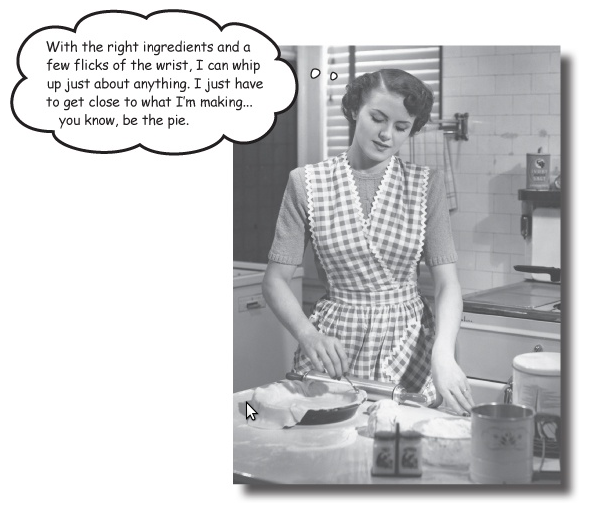The idiom is actually "Be the X" or "Be X." "Be the pie" in the sentence you quoted is just the idiom as applied to that one situation. It's half-joke, half-serious.
The idiom is a parody of various schools of performance that encourage the student to abandon conscious control or preconceptions and pay attention to the task in a Zen-like manner. For example, in Method acting, you are taught not to "act like the character" but to "BE the character". Going back to the teachings of Constantin Stanislavski, this approach cultivates the actor's ability to act naturally and spontaneously, just as one acts in real life, as opposed to "classical acting", which taught gestures, intonations, and analysis of the script in order to create deliberate, consciously controlled effects. In Method acting, if the character is supposed to be feeling a certain emotion, the actor should genuinely feel that emotion during the performance. This makes emotional expression truthful, as opposed to merely "indicated" as in classical acting.
Sport has a similar need to let go of conscious control in order to get your best performance. In the 1970s, the book The Inner Game of Tennis by Timothy Gallwey became popular among both tennis coaches and acting teachers, for its techniques of getting the conscious mind "out of the way" so one's unconscious talents could respond spontaneously to the situation. The most famous exercise of this book was to watch the rotation of the tennis ball in order to give the conscious mind a sort of distraction while enabling the unconscious mind to see the motion of the ball and orchestrate all the precise muscular movements needed to hit it accurately.
Martial arts involve the same difficulty. One of the earliest famous "Be X" exhortations is Bruce Lee's "Be water, my friend" from 1971.
This whole style of teaching and coaching was briefly parodied in the 1980 movie Caddyshack. A pro golfer says to his caddy, "Danny, I'm going to give you a little advice. There's a force in the universe that makes things happen. All you have to do is get in touch with it. Stop thinking, let things happen, and be the ball." Danny finds it hard follow this advice, leading the golfer to complain, "You're not being the ball." This made "Be the ball" into a catchphrase in U.S. culture.
I don't know if any sports or acting coach ever really said "Be the ball," but this kind of teaching and coaching did reach some truly silly excesses in the 1970s. There's a famous, possibly not-entirely-true story about Dustin Hoffman and Laurence Olivier working together on Marathon Man in 1976. Hoffman came in for work disheveled and unrested. Olivier asked what happened, and Hoffman said he had stayed up three days and nights just as his character had. Olivier said, "Why don't you just try acting?" It should be noted, though, that Method acting really did revolutionize acting in the mid-20th century, producing acting performances more emotionally powerful and genuine than anything anyone had seen before.
Not to be confused with this.

